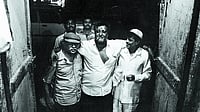For the record, this is no hill station boarding school offering alternative education to the rich. Admission is free, so is boarding. Children can walk in any time of the year into this school-cum-home. "The parents are mostly labourers. We have children here who don’t even have a home to go to during summer holidays," says headmaster G. Jeyakodi. Class VII student Ravi is a case in point. "My parents work as coolies in Madras," he says. "I visit them once in two years." Incidentally, Chennai is some 800 km away.
"Around 300 students have been staying here for close to three years now, without seeing their relations," says Saroja Karuppaswamy, a teacher and whose great-great-grandfather Muthukkaruppan started the school. Nobody remembers the exact year the school was started. "Decades ago" is the common refrain, even among the elders. Muthukkaruppan was a Dalit who through sheer effort accumulated around 500 acres of land during his lifetime in this Naicker-dominated village. "He passionately felt that everyone was entitled to free education. Hence the school," says Jeyakodi. There’s no one here now who remembers seeing Muthukkaruppan alive. But his vision has gained strength with time.
A primary school for decades, in 1960 it was upgraded to middle-school status. Registered as a trust in ’82, the school has been training children till Class XII since ’93. Of the nine hostels the school maintains, seven are supported by the government. Besides these, the school administration also runs two Muthukkaruppan Memorial Hostels, one each for boys and girls. They account for the bulk of the residents—around 3,000 students. "The Adi-Dravidar welfare department allots Rs 150 per month to students under its care," says Jeyakodi. The school trust makes up for the rest.
There’s not much in terms of infrastructure too: several classes can be seen happening in the shade of the trees, and the hostels are massive halls with hardly any flooring or a decent roof. Even benches and tables are a luxury, privileged only for students from Class X up. The rest squat in ramshackle rooms. But for the students at Muthukkaruppan School, these are hardly issues.
The school has a reputation for providing education and shelter to students from caste clash-affected villages. "From the Mudukalathoor clashes of ’57 to the police violence in Sankaralingapuram in 2001, our school’s doors have been open round the year to every student whose education has been affected." The southern districts of the state are communal hotspots witness to intermittent clashes between the Thevars/Naickers and the Dalits. In November last, police had swooped down on Sankaralingapuram, in the same Tuticorin district, arrested 180 Dalits and destroyed the entire colony. It took three months for the residents to return to their broken homes. "Several students, especially those facing Board exams, got admitted to our school," says Jeyakodi.
Despite all this, the school still has an impeccable pass percentage. In the just-announced Class XII results for 2002, it recorded 83 per cent pass. "Unlike private schools, we take in everybody. In fact, 40 per cent of our Class X and Class XII students are on their second or third attempt," says a proud Jeyakodi. But why admit them then? "If we don’t, they will turn out no different from their parents. Education is one weapon we can give them," says Saroja. The school’s produced three engineers, a doctor, teachers, even police personnel. The Tuticorin collector honoured Jeyakodi last month and the DEO always singles out the school for praise. But a school doesn’t run on praise alone. Material and infrastructural help are of the essence. For more information, contact G. Jeyakodi, Muthukkaruppan Adi-Dravidar Higher Secondary School, Sillankulam, Ottapidaram taluk, Tuticorin district, Tamil Nadu-628718. Ph: 0461-262211/ 262255.
























